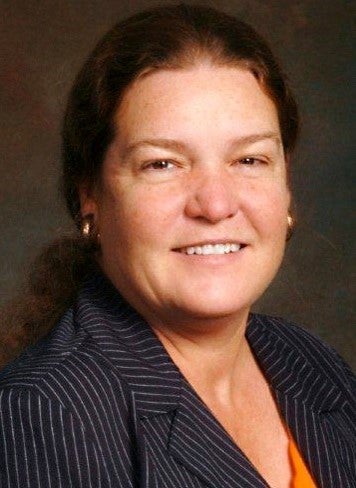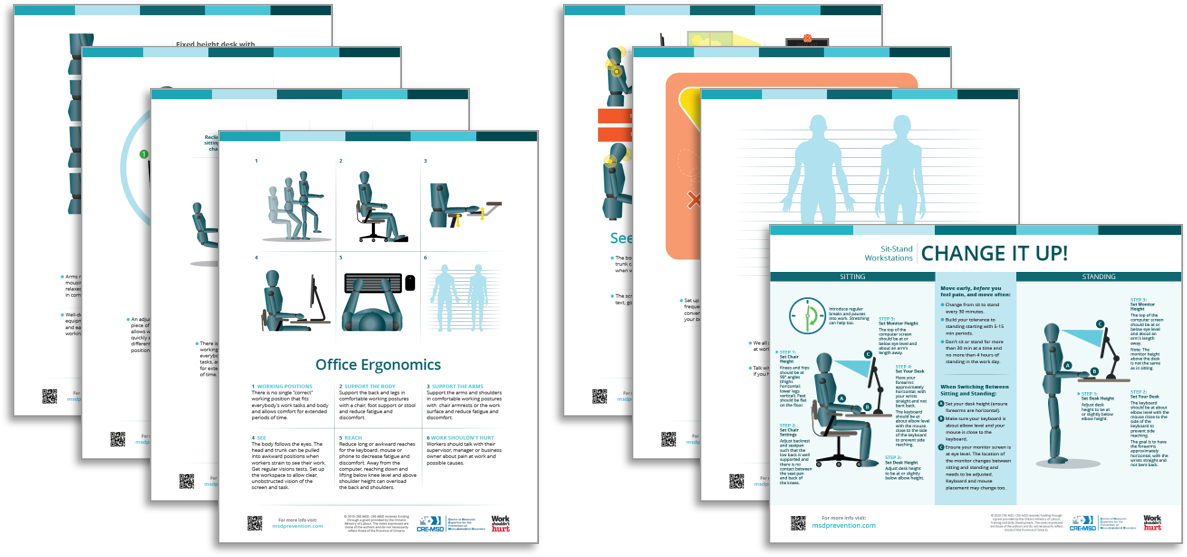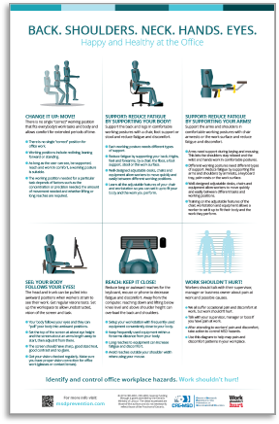Webinar series
The COVID-19 pandemic has forced a rapid change in the way we work and the need to support workers at the office and at home. Adjustments have been made including work hours, equipment, physical space layout and work format, be it virtual or masked in-person. The temporary remote work instituted in March of 2020 resulted in using makeshift workstations at kitchen counters, spare bedrooms, and living rooms, a situation that continues for many to persist over 1.5 years later.
Join CRE-MSD, IHSA, PSHSA, WSPS, and OHCOW during Global Ergonomics Month in October for this free webinar series featuring six international experts. The series will explore flexible/hybrid office environments and returning to on-site office workspaces, how these can be supported, the impact on health, moving beyond the constraints of individual productivity, and a look at what a true “virtual” workspace will look like in the future.
This five-part webinar series will examine research on how pivoting imposed by COVID-19 health hazards has impacted workers and challenged the health and safety support system’s ability to ensure ‘work shouldn’t hurt’. It will assist organizations to learn about and help prevent physical, cognitive and psychological challenges related to remote work practices implemented during COVID-19.
Other webinars in the series
Expanding the Bounds of Seated Virtual Workspaces
In this webinar
In response to the COVID-19 pandemic, an abrupt shift in the nature of work systems across the globe has occurred with a dramatic increase in the number of people who are working remotely from their homes. Work From Home (WFH) is the “new way of working,” in which employees’ homes have become their workplaces. Going forward, as the re-opening of office workplaces is being considered, the planning and design of these alternative and new flexible/hybrid office environments is occurring. Attention to human factors/ergonomics (HF/E) issues from both micro- (individual workers) and macro- (organization and environment) perspectives is essential to support and protect workers, to ensure worker wellbeing and performance, and to achieve the benefits of these new work arrangements.
In this webinar, Dr. Robertson will present a work systems perspective to consider in the creation and design of these new office work styles, such as telework programs and hybrid work arrangements. She will also discuss her telework research and provide valuable key recommendations to consider when managing the safety, wellbeing and performance of workers in these challenging times.
About the presenter

Dr. Michelle Robertson is the Executive Director of the Office Ergonomics Research Committee, a lecturer at Northeastern University and the University of California, Berkeley Center of Occupational and Environmental Health, and a research faculty member at the University of Connecticut, Psychological Sciences. Previously, she was a research scientist in human factors and ergonomics at the Liberty Mutual Research Institute for Safety, where she conducted field and applied research projects in a variety of industries including financial, telecommunications, aerospace and surface transportation, manufacturing, and healthcare.
Dr. Robertson has dedicated more than 20 years of her career in systematically designing and evaluating organizational and training interventions that include participatory and macroergonomics approaches, work organization factors, training system design, computer work environments, office ergonomics, and designing integrated wellness and ergonomics programs. She was on faculty at the University of Southern California for 12 years, where she taught graduate and undergraduate courses in human factors, training, safety and management. She is a Fellow of the Human Factors and Ergonomics Society and the International and Ergonomics Association. Currently, Dr. Robertson is working with the Center for Promotion of Health in the New England Workplaces (CPH-NEW) with UMASS Lowell and UCONN developing an organizational readiness survey and supporting outreach activities.
Dr. Robertson is a Board-Certified Professional Ergonomist (CPE) and holds a Ph.D. in Instructional Technology, M.S. in Systems Management from the University of Southern California and a B.A. in Human Factors/Ergonomics from the University of California Santa Barbara. She has published over 95 articles in human factors/ergonomics and has presented her work nationally and internationally. She has been the recipient of several awards, including the NORA/NIOSH innovative research award for her work on designing a macro-ergonomics training program, the NIOSH/APA Best Intervention Honorable Mention paper for her office ergonomics intervention research, and the HFES Alphonse Chapanis best paper award.
Webinar resources
Webinar recording (Webex)
Password: Work2021
Webinar slide presentation (PDF)
Other resources
We encourage you to take advantage of CRE-MSD resources such as the Office Quick Start Guideline, a collection of posters/infographics that provide basic information and quick workplace fixes for preventing MSD while performing office work. This free resource is part of the MSD Prevention Guideline for Ontario.



For assistance, please contact Betina Butler at bbutler@uwaterloo.ca.
Disclaimer: CRE-MSD receives funding through a grant provided by the Ontario Ministry of Labour, Training and Skills Development (MLTSD). The views expressed are those of the presenters and do not necessarily reflect those of the Centre nor of the Province of Ontario.